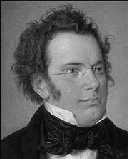Dirk Verdonk (06/10/1922 - 02/12/2002), a Dutch composer, born and died in Vaals, The Netherlands. He descends in a straight line from the known southern Dutch composer of the 16th century Verdonck. From this composer is a portrait painted by Frans Hals. The ancestral lines are documented by the Genealogical Research Foundation Verdonk.
As leitmotif for his life he calls "my poor health. This bothered him well in his studies and in his musical career. He was born on 6 October 1922 in Vaals, where his father worked in the border police. Home was a piano, on which a violinist father played about the same repertoire as Andre Rieu and his orchestra now. They performed at venues hence. In 1936 his mother died two years later his father remarried and moved the piano into the new house. Dirk and his sister were not there very welcome: they went live with their grandparents. Dirk studied piano and organ lessons with the organist Knittel St.Pauluskerk. Soon he could also assist and replaced by his many activities, sometimes three sung miss a day. Knittel taught him music theory in counterpoint and harmony. He was also conductor of the Cecilia Men to Vaals.
In 1939, Verdonk announced himself as a student at the Gregoriushaus in Aachen, part of the Conservatory. The main leading figures there were Mr and Neuver Freistedt. There he attended a church musician. That was not without difficulties. The Germans attacked in 1940 in Netherlands, Aachen was unreachable for some time. The study in Aachen lasted until the big bombardment in November 1944, with 40 students (from the boarding school) of the church music died. Partly as a result he could not complete the course in Aachen.
Dirk Verdonk 1960aan studied from 1958 to the Conservatory of Maastricht. His teachers have included Cardous for wind band's management, K. of Wersch for piano, M. Koekelkoren for harmony, W. Heystek for hearing / ear training, Th. Franssen for general music theory. Due to illness he is not able to complete that study.
Immediately after the liberation, he played about a year in a dance band at the Americans. And then there is a long list of work as a supervisor of several choirs, and churches in polyphonic miss the St.Pauluskerk, the monastery church of the Redemptorists and Camilianen, and in other places throughout South Limburg. He has worked with the Royal Male Choir Cecilia Vaals 1837 (from 1960 to 1970 second conductor), the St.Josefkoor Vaals, the Camilluskoor, St.Cecilia Gulpen, Mechels Vocal Ensemble. From the construction until its closure in 2000 he was organist for more than 20 years (in free service) of the St.Josefkerk Vaals. He could move as freely in his profession because he was financially independent: "My hobby is my profession."
From 1940 to ± 1960 Dirk Verdonk composed in what is called: the traditional style. Most works from this period he has destroyed. Work for chorus can still be found in the archives of the choir of the St.Josefkerk. Also there are some choral pieces and organ of his hand. Decisive for the development of his own style is the book by Herbert Eimert Lehrbuch der zwölftontechniek been (Breitkopf & Härtel 1973). From there he created his own musical language: composing with 12 tones. Rhythmically, he was inspired by work study available in the library or the Maastricht Aachen's city library, such as a trumpet method.
Highlights for him the Writers Commemoration Concert (1960-70) with the St.Ceciliakoor Vaals under his leadership in the Basilica of Our Lady in Maastricht, the baritone soloist and the organist Leo Ketelaars M. Prange. Further highlights were several concert tours with the Kings. Men St.Cecilia in 1963 to Innsbruck and Salzburg, where he also conducted. Importantly, the performance of his Four Seasons, for 4 harps, it was composed for Phia Berghout, and was on 13 July 1980 on the occasion of the 20th International Harp Week in the Abbey Church of Rolduc, Kerkrade performed. On 5 October 1997, there was a concert in the Kopermolen to Vaals, almost entirely the work of Dirk devoted Verdonk. He died in Vaals on 2 December 2002.
Requiem In memoriam Franz Schubert
| Period: | Modernism |
| Composed in: | 1993 |
| In memory of: | Franz Schubert |
Requiem In memoriam Franz Schubert (arr. of Schubert's "Messe in G - Dur" D.167) for mixed choir and solo (mS or B) organ, strings and pauken.
 |
Franz Schubert
(dedicatee) |